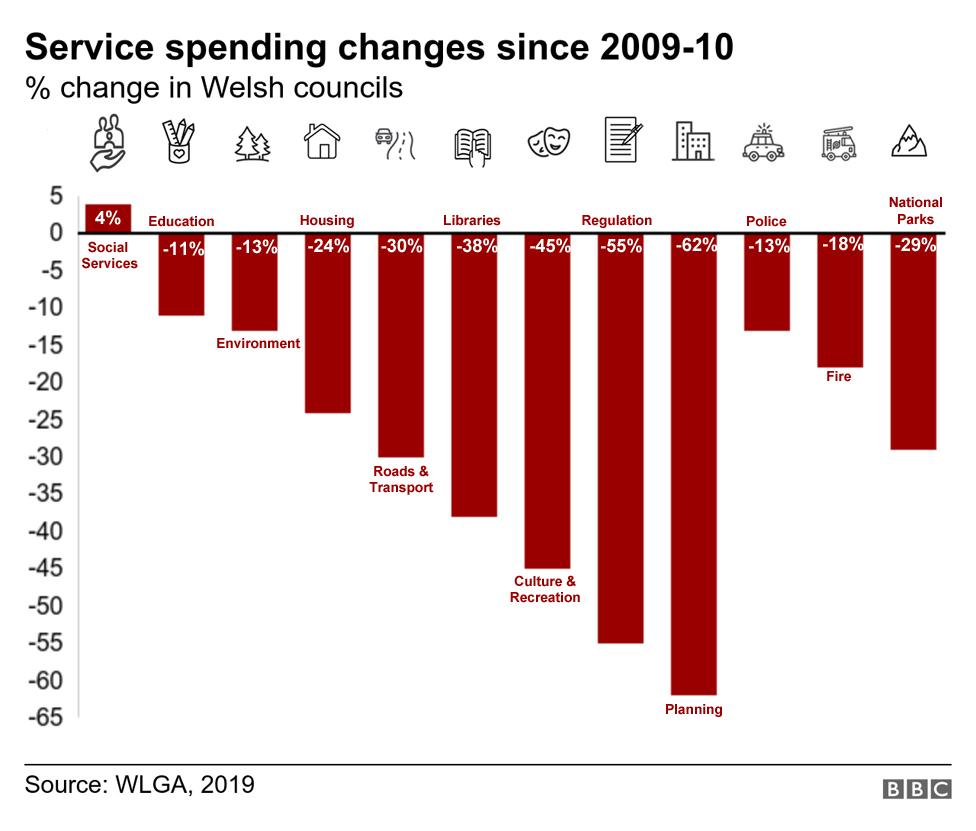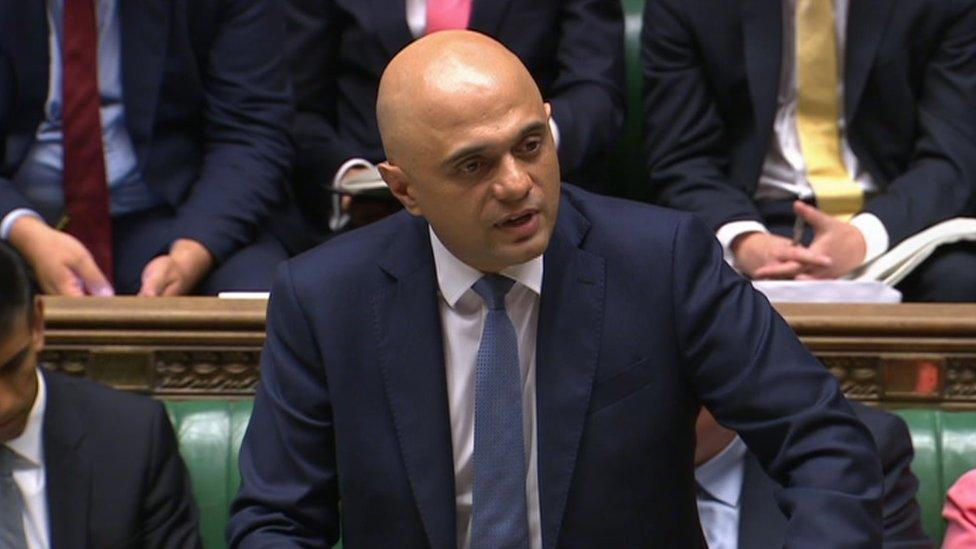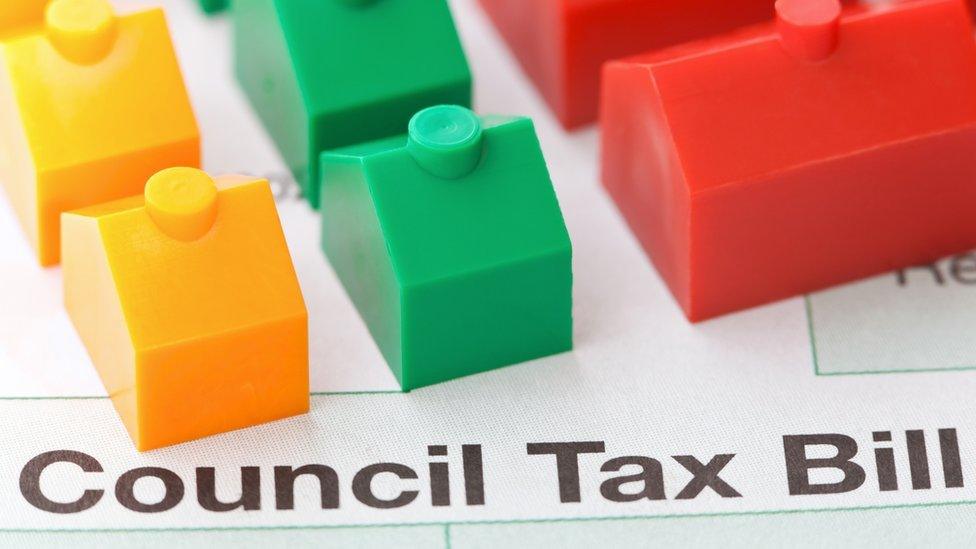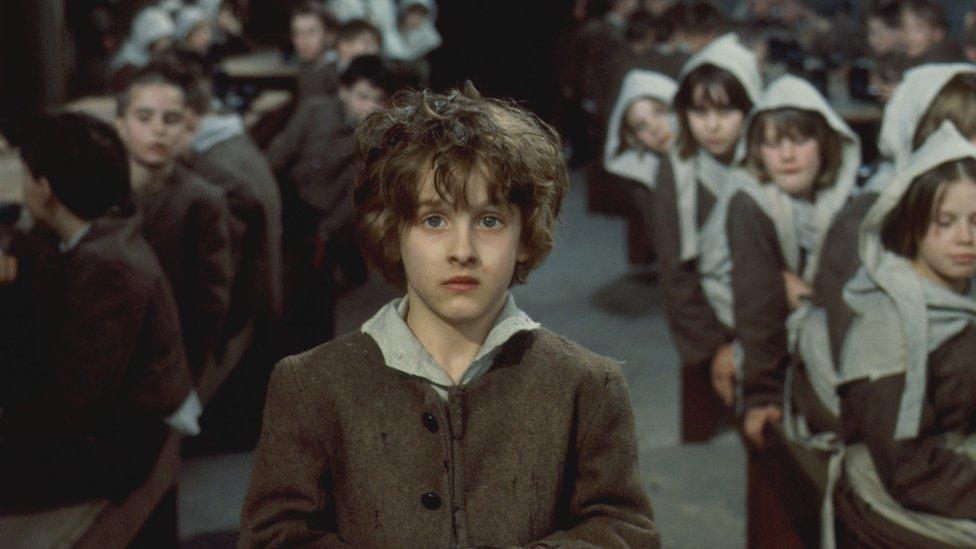Welsh councils fear 'permanent damage' from cuts
- Published

Spending will have to grow at 4% a year above inflation to meet increasing demand for adult social care in Wales
Council leaders in Wales have warned cuts to their income are threatening key services and risk "permanently damaging" communities.
Writing to MPs and AMs, the Welsh Local Government Association (WLGA) said councils need an extra £147m just to cover "unavoidable" workers' pay rises.
"It sounds like Groundhog Day but after 10 years we've come to the end of the road," said WLGA leader Debbie Wilcox.
She said it could mean fewer teachers and less money for social care.
Councils receive 75% of their money from the Welsh Government, which in turn gets funding from Westminster.
But the money councils get from the Welsh Government has fallen by nearly 20% in the last 10 years - and despite rises in council tax to meet some of the shortfall, total spending has gone down.

Ms Wilcox, who is also leader of Newport Council, has written the letter to coincide with the UK government's spending announcement., external
Chancellor Sajid Javid outlined in the House of Commons that the Welsh Government would be getting an extra £600m as part of the "biggest spending settlement for a decade" for the devolved nations, with funding rising to £14.8bn for 2020-21.
The Treasury said this amounts to 2.3% real terms growth.
The WLGA letter said the Welsh Government had protected local authorities to a certain extent, despite "significant cuts during the long period of austerity".
But it warns unavoidable pay and pension costs for council workers are increasingly driving "significant inflationary pressures".
"Without more resources, schools will have to drastically pull back on teaching and non-teaching staff levels," the WLGA said in a briefing report.
"Social care thresholds will need to increase. Vital spending on key services such as economic development, public protection, waste and culture will be pared back even further".

Services like environmental health are facing cuts and "the social safety net" is being taken away, say council leaders
What does the WLGA want?
Full funding and protection of local government workforce costs - just to stand still in providing current services, councils would need £254m next year
Additional investment in high-cost, high-need services to reflect complex needs
New responsibilities under the future generations legislation to be fully funded
Local government funding pegged to the Welsh Government budget


Where are the pressures?
Growing demands in children's services, with a 36% rise in children in care in the last nine years
Nearly 77,000 people receive social services from Welsh councils, accounting for 17% of what councils spend - and demand is rising with an ageing population
Councils are committing to building more homes and improving existing ones. Numbers of homeless households are rising, with more than 9,000 under threat last year
There has already been a 45% cut in recreation and leisure spending since 2009-10, and spending on libraries fell by 38% according to the WLGA, who say these services "form the fabric of communities"
Services like environmental health, licensing and trading standards "protect the fundamentals of life" but are under "significant threat"
Recent progress on recycling waste could be threatened if reductions in funding continue
Highways maintenance, including dealing with potholes, needs sufficient funding and the WLGA says this has fallen by 26% since 2009-10

Councils get 75% of their money from the Welsh Government
Wrexham council leader Mark Pritchard paints a bleak picture, with his council facing a black hole of almost £10m and a "disaster" if they do not get a "fair settlement".
"It won't be just that we start trimming services, we will have to have the discussions, and we are having discussions on what services we stop," he said.
Conwy council needs to plug a £12.5m deficit and its leader Sam Rowlands said most of the pressures arise from external demands or government policy.
"It is fair to say that there are huge financial challenges in respect of services to children generally, together with the financial pressures in adult social services," he said.
Ms Wilcox said councils had not been crying wolf over funding cuts in the past but it had now reached a critical point.
"They will see fewer teachers, fewer teaching assistants, they will see less social care, they will see more potholes, less environmental services, more services being closed because we cannot pay for things without money," she told BBC Wales.
Councils are also arguing they have an important economic role: They are big employers - one in 10 of us work for a local authority - and are big spenders too, worth £3.5bn a year.
- Published4 September 2019

- Published9 March 2019

- Published24 October 2018

- Published9 October 2018
